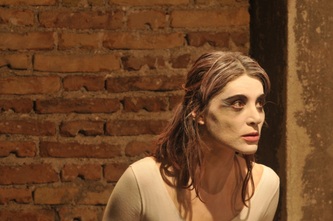I am fortunate enough to possess a large library of Beginners Guides, which have allowed me to pick random quotes from Great Thinkers and convince myself that readers will be fooled by my seeming erudition. To further my reputation as the intellectual voice of performance criticism, I looked for those shows that suggest I am familiar with philosophy and reason.
Nietzsche is one of my favourite philosophers, mainly because his later works express an arrogance that matches my own. And he had a habit of throwing out one-liners that are open to misinterpretation. God is dead - an easy statement of atheism or a carefully balanced contradiction that can never be resolved?
Two shows are grappling this grand-dad of post-modernism: The Most Dangerous Toy, and The Jhiva of Nietzsche. One's performed by a yoga teacher and describes how the Big Man's soul might have viewed his life. The other's about his relationship with Lou Salome, who could give him as good as he gave. There's a picture of her about to whip him.
The Spaces @ Surgeons Hall, August 3 – 18 (not 5, 12) 7.05pm (50 min)
Theatro Transcendental, meanwhile, are all about the snazzy technological at the service of the metaphysical.
 Digital projection represents Nietzsche's mind, while Korina Kontaxaki is his Jhiva (Soul – in Ancient Indian). The split between live performance and the screen evokes a disjuncture between the realms of thought and the spiritual (Nietzsche did utterly reject the later): The Jhiva of Nietzsche attempts to reveal the tension behind his increasingly extreme declarations.
Digital projection represents Nietzsche's mind, while Korina Kontaxaki is his Jhiva (Soul – in Ancient Indian). The split between live performance and the screen evokes a disjuncture between the realms of thought and the spiritual (Nietzsche did utterly reject the later): The Jhiva of Nietzsche attempts to reveal the tension behind his increasingly extreme declarations.
It's intriguing to guess whether the love story or the theological speculation would be more acceptable to the philosopher (odds are, neither, as he had a taste for sex and death, and liked Wagner until he got all soft). But he'd appreciate the multi-media, as his final public act did involve a self-consciously dramatic break-down.
theSpace @ Surgeons Hall, 3 -18 August (not Sundays)
Beulah by Alexander Wright gets in my Brains Trust Five on the grounds that the title is a word I don't know, looks at the liminal space between sleep and wakefulness, and mentions Blake in the press release. I'm not sure Blake counts as an intellectual, but he has the same knack for the pithy one-liner as Nietzsche ("the road of excess leads to the place of wisdom," indeed). It's a musical, and has puppets and live music (two performers and ten instruments).
The company behind Beulah, The Flanagan Collective, are part of LittleFest, an attempt to create an enclave in the confusing mess of the Fringe free-for-all, and the foundation of the show rests on complex calculations about the time spent sleeping. And after the thunder and lightning of my first two choices, I need a rest.
C nova 2–27 Aug (not 13)
 Because I know that Puppet. Book of Splendour won't let me snooze. It's a lively take on the Book of Job, using the Kabbalah and echoes from the life of Polish theatre maverick Kantor. There are angels in fuzzy white wigs, singing gospel, long readings from Jewish mystical texts, the darkest light projections I have ever seen and a healthy dose of avant-garde chaos.
Because I know that Puppet. Book of Splendour won't let me snooze. It's a lively take on the Book of Job, using the Kabbalah and echoes from the life of Polish theatre maverick Kantor. There are angels in fuzzy white wigs, singing gospel, long readings from Jewish mystical texts, the darkest light projections I have ever seen and a healthy dose of avant-garde chaos.
Essentially, the Book of Job - once an early attempt to question the nature of evil, now a good place for atheists to source quotations that put God in a bad life - is translated into a guide to creativity. A cool kid learns about the divine, while Kantor, disguised as a painter, splashes about in the via negativa towards understanding.
Fearful as I am of being labelled pretentious, I feel I have captured the flavour of Puppet: I like theatrical mayhem and the quest for the holy, and support any effort to mix up theology and theatrical criticism.
Summerhall, 3 -13 August
And finally - some comedy. Mark Allen presents The Humble Quest for Universal Genius, a panel show that tries "to find a modern-day Renaissance Man/Woman by testing contestants’ skills in rounds such as maths, languages, etiquette, science, anthropology, poetry, wit, literature and hunting."
Frankly, my opinion of stand-ups being less than respectful, I am hoping no-one wins, and that they recognise me as the true mad genius of criticism - without me having to face off against their contestants. The line up includes Sara Pascoe, Andrew Maxwell, Josie Long, Mark Watson, Josh Widdicombe. Actually, I am conceding already. These people have quick wits, whereas I steal most of my lines off Wikipedia and press releases.
Still, just doing this top five makes me feel smarter.
No comments :
Post a Comment